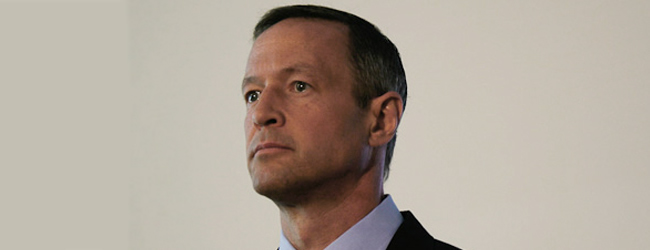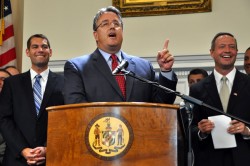Local
Maryland prepares for marriage referendum
O’Malley’s signature makes state eighth to legalize gay nuptials


Maryland Gov. Martin O’Malley was scheduled to sign the state’s marriage equality bill into law on Thursday. (Washington Blade file photo by Michael Key)
Maryland Gov. Martin O’Malley was scheduled to sign a bill to legalize same-sex marriage at a ceremony at the State Capitol building in Annapolis Thursday afternoon, highlighting what LGBT activists consider an historic advancement for marriage equality.
O’Malley’s signature on the Civil Marriage Protection Act was also considered the kick-off for what political observers predict will be an acrimonious referendum campaign in which opponents will ask Maryland voters to kill the bill before it becomes law.
Opponents were expected to gather the required number of petition signatures needed to place the referendum on the ballot for the November election.
The governor’s bill signing ceremony was set to take place one week after the Maryland Senate voted 25 to 22 to approve the marriage bill. The vote came after senators supporting the bill defeated six hostile amendments introduced by opponents.
The vote to approve the bill triggered a burst of applause and cheers in the Senate chamber by supportive lawmakers and LGBT activists, who packed the visitors gallery.
“We could not be more grateful to the senators who today voted to make all Maryland families stronger,” said Joe Solmonese, president of the Human Rights Campaign, which is a member of Marylanders for Marriage Equality, a coalition of LGBT and allied organizations that pushed for the bill.
“Today we took another giant step toward marriage equality becoming law — and we are in this position due to the unwavering leadership and resolve of Gov. O’Malley and our legislative allies,” Solmonese said.
U.S. House Minority Leader Nancy Pelosi (D-Calif.) called the Senate vote “an extraordinary victory for the people of Maryland and a critical step forward in the march for marriage equality nationwide.”
Pelosi added, “As a native Marylander, this vote is a source of personal pride; as an American this action is a symbol of our progress as a nation and as a people.”

Maryland Sen. Rich Madaleno (D-Montgomery County) said he considers himself a ‘married man’ and part of the ‘family of Maryland’ without the right to legalize his and his partner’s relationship with a marriage license. (Washington Blade photo by Michael Key)
The Senate vote came six days after the Maryland House of Delegates passed the bill by a razor-thin two-vote margin. That vote followed an intense lobbying effort by O’Malley, who is credited with helping to persuade the few wavering Democratic delegates needed to put the bill over the top.
Unlike past years, O’Malley this year introduced the marriage bill as part of his legislative package and placed all of the resources of his office behind the bill.
But supportive and opposing lawmakers acknowledged in the Senate floor debate Thursday night that the Civil Marriage Protection Act now faces its most daunting hurdle — a bruising referendum campaign leading up to the November election, when voters will have the final say on whether the bill should be enacted into law.
Public opinion polls show Maryland voters are nearly evenly divided on the issue of same-sex marriage, with supporters showing a slight lead.
Most political observers believe opponents of the bill have the resources to gather the required number of petition signatures needed to place the measure on the ballot in the November election, when President Barack Obama’s name will also be on the ballot.
The referendum campaign received a boost last Friday, when the Fox TV station in Baltimore, WBFF, posted a prominent link to the website gathering signatures for the referendum on its homepage.
Scott Livingston, news director at WBFF, denied any corporate involvement in promoting the referendum campaign.
“We are not endorsing any element of this debate,” Livingston told the Blade. “We see it as a political process. Our goal is letting viewers understand they have a voice in the debate.” He added that the site has now been “modified.” The link that previously sent readers directly to the petition site now goes to a new page within the WBFF site that also includes a link to Equality Maryland’s website. The change followed what Livingston characterized as a “handful” of complaints from WBFF viewers.
The marriage bill died in the House of Delegates last year after clearing the Senate. Supporters decided to pull it from the House floor without a vote after determining they didn’t have the votes to pass it.
The Senate passed the bill last year by a vote of 25-21. Its approval of the bill on Thursday night by a 25-22 vote did not represent a change in the breakdown of supporters and opponents, according to observers at the state capital in Annapolis.
Sen. Joanne Benson (D-Prince George’s County) announced her opposition to the bill last year but was unable to reach the Senate floor to vote at that time, resulting in her being listed as not voting. Benson voted ‘no’ on the bill this time.
She was among 11 Democrats who voted against the bill last week, opposing the 24 Democrats who voted ‘yes’ in the 47-member Senate.
Eleven Republicans voted against the bill, with just one, Sen. Allan Kittleman (R-Carroll & Howard Counties), voting for it.
In the House debate, several opponents delivered highly emotional speeches condemning the bill as a threat to traditional marriage and an infringement on religious rights. The Senate debate was more measured, with opponents saying their positions were based mostly on religious beliefs while expressing respect for same-sex couples.
Sen. Jamie Raskin (D-Montgomery County), an American University law professor, served as floor leader for the marriage bill. LGBT advocates for the bill have long credited him with using a firm but diplomatic approach in refuting arguments that legalizing same-sex marriage would infringe on religious rights or create problems for traditional marriage.
Sen. Rich Madaleno (D-Montgomery County), the Senate’s only openly gay member, called on his colleagues to support the bill to provide equality and dignity to “all” families, including those headed by same-sex couples.
“We all cherish families,” he said, adding that the bill is intended for “people who find love and want a family.”
Noting that he and his partner are raising two kids, Madaleno said he considers himself a “married man” and part of the “family of Maryland” without the right to legalize his and his partner’s relationship with a marriage license.
“It is the marriage license that symbolizes the commitment,” he said. “It makes it worthwhile. I want that marriage license in the State of Maryland.”
In his closing remarks, Raskin praised his fellow senators on both sides of the political aisle for their “extraordinary civility and decency and even affection that pervaded these very tough discussions.”
He told of his personal bout with colon cancer last year, just as the Senate deliberated over the marriage bill, saying his doctors have given him a “clean bill of health” at this time.
“But I learned that there is a difference between misfortune and injustice in life,” he said, noting that a cancer diagnosis, which can happen to anyone, is a misfortune.
“But if you find someone to love in this life and to have and to hold and to dedicate your life to and you have kids together and you want to be married… and you can’t do it, that’s not a misfortune, that’s an injustice because we have the power to do something about it,” he said. “And today we have.”
Senate observers said Senate President Thomas V. Mike Miller (D-Anne Arundel County), who voted against the bill, took the unusual step of explaining why he did so. Miller, who has said all along that he opposes same-sex marriage on religious grounds, has been praised by the bill’s supporters for making sure it would reach the floor for a vote.
“Am I on the wrong side of history?” he asked. “As a historian, there is no doubt about it… I believe marriage is between a husband and a wife and that is why I voted the way I did,” he said.
Should Maryland’s marriage equality bill clear the referendum hurdle, the state joins D.C., Massachusetts, New York, Iowa, New Hampshire, Connecticut, Vermont and Washington State in allowing same-sex couples to marry.
“There remains a lot of work to do between now and November to make marriage equality a reality in Maryland,” said HRC’s Solmonese. “Along with coalition partners, we look forward to educating and engaging voters about what this bill does. It strengthens all Maryland families and protects religious liberty.”
Evan Wolfson, executive director of Freedom to Marry, the national same-sex marriage advocacy organization, startled HRC and other partners of the Marylanders for Marriage Equality coalition earlier this year when he expressed concern that supporters of the bill had not demonstrated the capability to win in a referendum fight.
“Lesbian and gay couples, their families, and non-gay friends and neighbors made a powerful case for the freedom to marry, which all should enjoy,” Wolfson told the Blade after the Maryland Senate vote Thursday night.
“The lawmakers responded to these moving stories of love and commitment,” he said. “Now, HRC, Marylanders for Marriage Equality, and those who led the passage of this bill must defend it against the attack coming in November. “
Asked if Freedom to Marry would become involved in the Maryland referendum fight, Wolfson said only, “You have my comment.”
Maryland
Md. Commission on LGBTQIA+ Affairs released updated student recommendations
LGBTQ students report higher rates of bullying, suicide

The Maryland Commission on LGBTQIA+ Affairs has released updated recommendations on how the state’s schools can support LGBTQ students.
The updated 16-page document outlines eight “actionable recommendations” for Maryland schools, supplemented with data and links to additional resources. The recommendations are:
- Developing and passing a uniform statewide and comprehensive policy aimed at protecting “transgender, nonbinary, and gender expansive students” against discrimination. The recommendation lists minimum requirements for the policy to address: name, pronoun usage, and restroom access.
- Requiring all educators to receive training about the specific needs of LGBTQ students, by trained facilitators. The training’s “core competencies” include instruction on terminology, data, and support for students.
- Implementing LGBTQ-inclusive curricula and preventing book bans. The report highlights a “comprehensive sexual education curriculum” as specifically important in the overall education curriculum. It also states the curriculum will “provide all students with life-saving information about how to protect themselves and others in sexual and romantic situations.”
- Establishing Gender Sexuality Alliances “at all schools and in all grade levels.” This recommendation includes measures on how to adequately establish effective GSAs, such as campaign advertising, and official state resources that outline how to establish and maintain a GSA.
- Providing resources to students’ family members and supporters. This recommendation proposes partnering with local education agencies to provide “culturally responsive, LGBTQIA+ affirming family engagement initiatives.”
- Collecting statewide data on LGBTQ youth. The data on Maryland’s LGBTQ youth population is sparse and non-exhaustive, and this recommendation seeks to collect information to inform policy and programming across the state for LGBTQ youth.
- Hiring a full-time team at the Maryland Department of Education that focuses on LGBTQ student achievement. These employees would have specific duties that include “advising on local and state, and federal policy” as well as developing the LGBTQ curriculum, and organizing the data and family resources.
- Promoting and ensuring awareness of the 2024 guidelines to support LGBTQ students.
The commission has 21 members, with elections every year, and open volunteer positions. It was created in 2021 and amended in 2023 to add more members.
The Governor’s Office of Communication says the commission’s goal is “to serve LGBTQIA+ Marylanders by galvanizing community voices, researching and addressing challenges, and advocating for policies to advance equity and inclusion.”
The commission is tasked with coming up with yearly recommendations. This year’s aim “to ensure that every child can learn in a safe, inclusive, and supportive environment.”
The Human Rights Campaign’s most recent report on LGBTQ youth revealed that 46.1 percent of LGBTQ youth felt unsafe in some school settings. Those numbers are higher for transgender students, with 54.9 percent of them saying they feel unsafe in school.
Maryland’s High School Youth Risk Behavior Survey reveals a disparity in mental health issues and concerns among students who identify as LGBTQ, compared to those who are heterosexual. LGBTQ students report higher rates of bullying, feelings of hopelessness, and suicidal thoughts. Nearly 36 percent of LGBTQ students report they have a suicide plan, and 26.7 percent of respondents say they have attempted to die by suicide.
The commission’s recommendations seek to combat the mental health crisis among the state’s LGBTQ students. They are also a call for local and state governments to work towards implementing them.
Virginia
Va. lawmakers consider partial restoration of Ryan White funds
State Department of Health in 2025 cut $20 million from Part B program

The Virginia General Assembly is considering the partial restoration of HIV funding that the state’s Department of Health cut last year.
The Department of Health in 2025 cut $20 million — or 67 percent of total funding — from the Ryan White Part B program.
The funding cuts started with the Trump-Vance administration passing budget cuts to federal HIV screening and protection programs. Rebate issues between the Virginia Department of Health and the company that provides HIV medications began.
Advocates say the funding cuts have disproportionately impacted lower-income people.
The Ryan White HIV/AIDS Program, a federal program started in 1990, provides medical services, public education, and essential services. Part B offers 21 services, seven of which remained funded after the budget cuts.
Equality Virginia notes “in 2025, a 67 percent reduction severely destabilized HIV services across the commonwealth.”
Virginia lawmakers have approved two bills — House Bill 30 and Senate Bill 30 — that would partially restore the funding. The Ryan White cuts remain a concern among community members.
Both chambers of the General Assembly must review their proposed changes before lawmakers can adopt the bills.
“While these amendments aren’t a full restoration of what community-based organizations lost, this marks a critical step toward stabilizing care for thousands of Virginians living with HIV,” said Equality Virginia Executive Director Narissa Rahaman. “Equality Virginia plans to continue their contact with lawmakers and delegates through the conference and up until the passing of the budget.”
“We appreciate lawmakers from both sides of the aisle who recognized the urgency of this moment and will work to ensure funding remains in the final version signed by the governor,” added Rahaman.
District of Columbia
D.C. Black Pride theme, performers announced at ‘Speakeasy’
Durand Bernarr to headline 2026 programming

The Center for Black Equity held its 2026 DC Black Pride Theme Reveal event at Union Stage on Monday. The evening, a “Speakeasy Happy Hour,” was hosted by Anthony Oakes and featured performances by Lolita Leopard and Keith Angelo. The Center for Black Equity organizes DC Black Pride.
Kenya Hutton, Center for Black Equity president and CEO, spoke following the performances by Leopard and Angelo. Hutton announced this year’s theme for DC Black Pride: “New Black Renaissance.”
Performers for 2026 DC Black Pride were announced to be Bang Garcon, Be Steadwell, Jay Columbus, Bennu Byrd, Rue Pratt and Akeem Woods.
Singer-songwriter Durand Bernarr was announced as the headliner for the 2026 festivities. Bernerr gave brief remarks through a video played on the screen at the stage.
DC Black Pride is scheduled for May 22-25. For more information on DC Black Pride, visit dcblackpride.org.


















